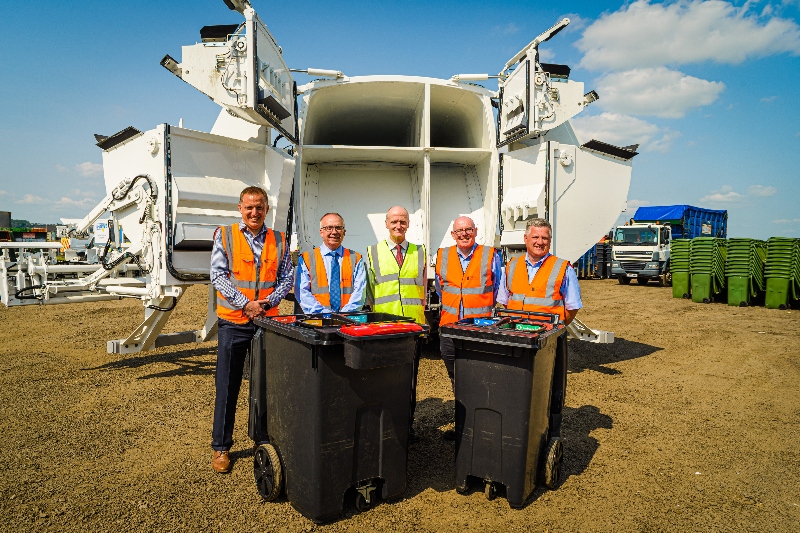North Somerset Council has trialled a recycling and waste system never before seen in the UK. LAPV looks at how they got on.


North Somerset Council recently trialled an innovative recycling and waste system. For four weeks during May and June, a sample of households across North Somerset tested out ‘Quatro’ which has been used in Scandinavia for around 20 years.
The system was identified as a potential advancement by North Somerset Environment Company (NSEC), an arm's length organisation set-up to supply the council’s recycling and waste services from April 2021, by working with one of its key suppliers, NTM-GB Ltd.
.jpg) The trial looked at the advantages and disadvantages of the Quatro system, which uses a specially designed wheelie bin for both recycling and waste.
The trial looked at the advantages and disadvantages of the Quatro system, which uses a specially designed wheelie bin for both recycling and waste.
Two sizes of the bin were trialled – a 240L and 370L. Each feature four compartments, a lid and three wheels. The 370L version also features a brake. The bins had a three-compartment addition which clipped onto the side of the bin. These allowed for batteries, spectacles, and lightbulbs to be collected. The trial bins were collected by a specialist collection lorry, on loan from NTM and transported from Sweden for the trial period. The lorry features a unique lift mechanism that matches the bin’s four compartments to the lorry’s four collection chambers.
The NTM Quatro vehicle is shorter than North Somerset’s current standard waste lorries. The smaller size and rear steer meant that more properties could be accessed than usual.
Participants were divided into four groups to trial different configurations of the bins. One group received two bins (a 240L and a 370L) which collected all of their waste and recycling during the trial period. A second group used a single bin for weekly recycling only and kept their existing 180L black wheelie bin for three-weekly residual waste. The other two trials used a single four compartment bin for recycling and retained existing residual and food waste collections.
.jpg) Participants responded very positively to the trial overall. Feedback showed that the trial bin made it easier to sort recycling and it also stopped recycling from being blown away on collection day, reducing litter.
Participants responded very positively to the trial overall. Feedback showed that the trial bin made it easier to sort recycling and it also stopped recycling from being blown away on collection day, reducing litter.
It wasn’t all positive though, participants found the 370L version of the bin too large and 40% found it a struggle to move on collection day, compared to 17% who experience the same issue with their regular bin. Reports included the bin not fitting through gates where bins are stored at the rear of properties. The council would therefore look to test the 240L version of the bin in subsequent trials.
Feedback on the variations in materials collected inside the different compartments concluded that an add-on compartment for batteries, spectacles, and lightbulbs, as well as the compartment inside the bin for textiles, were not well utilised. The council would therefore look at alternative collection methods for these materials in any subsequent trials.
Stuart Jellings, Operations Director at North Somerset Environment Company (NSEC), said: ‘Our crew really enjoyed the experience of trialling the NTM Quatro vehicle. They were particularly impressed with its manoeuvrability, especially in narrow lanes and roads. The wheeled bin collection method also proved a significant improvement in manual handling as crews did not have to pick up recycling boxes from the floor.
‘Due to trial participants finding the labelling of the compartments easy to understand, we experienced no contamination in compartments. Recycling materials were of the same quality as those materials sorted by our normal collection crews. The trial showed how important it is for the material compartment sizes to be the right size for residents.’
.jpg) After the initial four-week trial, the council analysed all the data. This included feedback from the trial participants and crew, as well as information about the quality of the material collected and additional activity such as time trials.
After the initial four-week trial, the council analysed all the data. This included feedback from the trial participants and crew, as well as information about the quality of the material collected and additional activity such as time trials.
A decision on whether to proceed to a second trial will be made following a full operational and financial analysis of the advantages and disadvantages of the system compared to existing arrangements. If the results are favourable, a second more in-depth trial would be rolled out by the end of 2023. Councillors would then review the results and decide how best to proceed.
Cllr Annemieke Waite, North Somerset Council's executive member for climate, waste and sustainability, said: “This project fits squarely with our vision to be a leading authority in minimising waste and tackling the climate emergency. Despite our existing excellent track record for recycling, we’re striving to improve even further by trailblazing more efficient and effective collection methods.’
This article first appeared in the Autumn issue of LAPV. To subscribe for free click here.